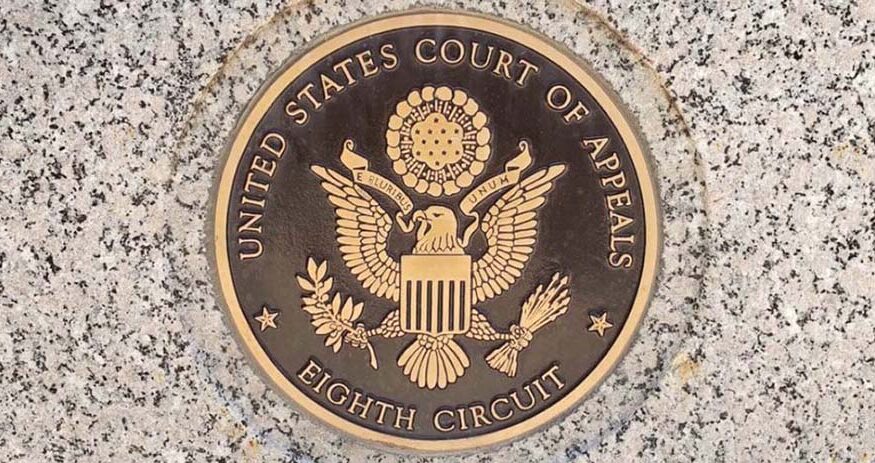8th Circuit sides with cop accused of 1st Amendment retaliation arrest
By: Bridgetower Media Newswires//September 14, 2023//
8th Circuit sides with cop accused of 1st Amendment retaliation arrest
By: Bridgetower Media Newswires//September 14, 2023//
ST. LOUIS — The 8th U.S. Circuit Court of Appeals sided with a police officer accused of arresting a man as retaliation for using his First Amendment right to free speech.
Officer Michael Schmitt of Sunrise Beach, Missouri, was patrolling a highway in 2021 when he saw a young man, Mason Murphy, walking along the road with the direction of traffic. Schmitt stopped and asked Murphy to identify himself, but the man refused, and a nine-minute argument began. Murphy asked why he was being detained and criticized the officer, who eventually arrested the pedestrian. Murphy asked for a reason for his arrest, which the officer did not give. While being driven to the Camden County Jail, Murphy asked again, and Schmitt then said the arrest was for “failure to identify.”
Schmitt made a phone call to an unknown person, saying he “saw the [expletive] walking down the highway and [he] would not identify himself,” and “ran his mouth off.” Schmitt then asked, “What can I charge him with?” Schmitt also said that he wanted Murphy to “sit here for being an [expletive].”
After two hours in a jail cell, Murphy — who had then been identified — was released.
Murphy filed a suit alleging unlawful detention and First Amendment retaliation. The U.S. District Court for the Western District of Missouri granted Schmitt’s motion to dismiss based on qualified immunity. Murphy and Schmitt agreed that the officer had probable cause to stop Murphy, as he was in violation of the Missouri statute against walking on the right side of a road with no sidewalks.
Murphy then appealed the dismissal of the First Amendment retaliation claim.
For a First Amendment retaliation claim to be successful, the plaintiff must have engaged in a protected activity, a government official must have taken adverse action that would “chill a person of ordinary firmness” from continuing, and the adverse action must have been motivated, at least in part, by the exercise of the protected activity, the 8th Circuit held in Greenman v. Jessen in 2015.
In most cases where probable cause exists, it would defeat a retaliatory arrest claim, but the U.S. Supreme Court arguably made one narrow exception, the 8th Circuit said, that plaintiffs presenting objective evidence that they were arrested when others in the same situation who did not engage in protected speech were not.
The Supreme Court gave an example of someone vocally criticizing the police being arrested for jaywalking where “jaywalking is endemic but rarely results in arrests.”
Murphy argued his case fits that exception because officers typically exercise their discretion not to arrest people walking on the wrong side of the road; a crime which the 8th Circuit agreed is similar to jaywalking. However, Murphy did not have evidence that officers regularly decide not to make arrests for that crime. Murphy believed such evidence was in the hands of the police department and could be found through further investigation or discovery if the case were allowed to move on.
Citing Ashcroft v. Iqbal, the 8th Circuit drew on “experience and common sense” to determine that the allegation did not state a plausible claim that walking on the wrong side of the road is endemic or so frequently observed that is it reasonable to believe that officers typically observe it and let it slide.
Murphy argued that, notwithstanding the above, the subjective intent of Schmitt was so clear that it should be considered retaliation. But, citing the Supreme Court’s 2019 ruling in Nieves v. Bartlett, the 8th Circuit said that an officer’s state of mind is irrelevant and that, to ensure that officers may go about their work without undue concern for being sued, courts must generally review their conduct under objective standards of reasonableness.
The 8th Circuit affirmed the district court’s ruling 2-1, with Judge Michael J. Melloy and Judge Jonathan A. Kobes siding with the officer.
Judge L. Steven Grasz dissented, finding that Murphy plausibly asserted that the Sunrise Beach Police Department does not regularly enforce the law against walking on the wrong side of the road.
According to Grasz, the events following the arrest indicate that Schmitt was “scrambling to justify the arrest.” The dissenting judge pointed to the officer changing his story about whether Schmitt appeared drunk, the officer asking someone on the phone what Murphy could be charged with, the officer complaining about Murphy running his mouth, and the officer insisting that Murphy should “sit here for being an [expletive].”
If the police department regularly arrests people for walking on the wrong side of the road, Grasz said, Schmitt and his colleagues would likely have had an easier time identifying that law as the basis for the arrest.
“Instead, viewing the factual allegations in the complaint in a light most favorable to Murphy, Officer Schmitt arrested Murphy for challenging and criticizing him before later exploring various legal justifications for the arrest. Indeed, the allegations of post hoc decision-making indicate pretext, which supports application of the Nieves exception,” Grasz wrote.
Additionally, the dissenting judge said that Murphy was never given the chance to discover and present objective evidence because the complaint was prematurely dismissed. Quoting Lozman v. City of Riviera Beach, Grasz said that an unyielding requirement to show the absence of probable cause could pose a risk that some officers would exploit their arrest powers to suppress speech.
W. Bevis Schock, a St. Louis-based attorney who represents Murphy, said he is asking for a rehearing or rehearing en banc. His focus in that petition will be aligned with Grasz’s statement that Murphy didn’t get the chance to obtain evidence that Schock believes will show that the Sunrise Beach Police Department does not arrest people for walking on the wrong side of the road.
But even without that evidence, Schock believes common sense is on Murphy’s side.
“Where I come to work, there are all these joggers, and half of them are walking with traffic and half of them are walking against traffic. I mean, nobody is getting arrested for that. It’s just silly,” Schock said.
Schmitt’s attorney, Wayne M. Jordan III of Newman, Comley & Ruth, said the 8th Circuit was right to affirm, since both parties agreed that the officer had probable cause.
“That was our key argument, that the officer did have the requisite probable cause, and the officer didn’t retaliate for what Mr. Murphy believed was the exercise of his First Amendment rights. We also argued that Mr. Murphy did not have the First Amendment protection to not identify himself,” Jordan said.
Legal News
- NAACP: No consequences for UWM Pro-Palestinian protesters shows ‘bias’ and ‘privilege’
- New complaints filed against Northwestern over Kenosha football hazing scandal
- Justice Department Submits Proposed Regulation to Reschedule Marijuana
- Reckless driving on Brown Deer Road results in fatal collision
- Lavinia Goodell 150th Anniversary Commemoration held June 17
- WisGOP reacts to Vice President’s Wisconsin visit
- Former prosecutor suspended for unwelcome contact during legal conference
- One Wisconsin Attorney’s misconduct ‘in a league of its own’
- Wisconsin election fraud charge issued from November 2022 general election
- Indigenous consultant accuses NHL’s Blackhawks of fraud, sexual harassment
- Man pleads guilty in theft of Arnold Palmer green jacket, other Masters memorabilia from Augusta
- KS Governor cites competition concerns while vetoing measure for school gun-detection technology
WLJ People
- Power 30 Personal Injury Attorneys – Russell Nicolet
- Power 30 Personal Injury Attorneys – Benjamin Nicolet
- Power 30 Personal Injury Attorneys – Dustin T. Woehl
- Power 30 Personal Injury Attorneys – Katherine Metzger
- Power 30 Personal Injury Attorneys – Joseph Ryan
- Power 30 Personal Injury Attorneys – James M. Ryan
- Power 30 Personal Injury Attorneys – Dana Wachs
- Power 30 Personal Injury Attorneys – Mark L. Thomsen
- Power 30 Personal Injury Attorneys – Matthew Lein
- Power 30 Personal Injury Attorneys – Jeffrey A. Pitman
- Power 30 Personal Injury Attorneys – William Pemberton
- Power 30 Personal Injury Attorneys – Howard S. Sicula













